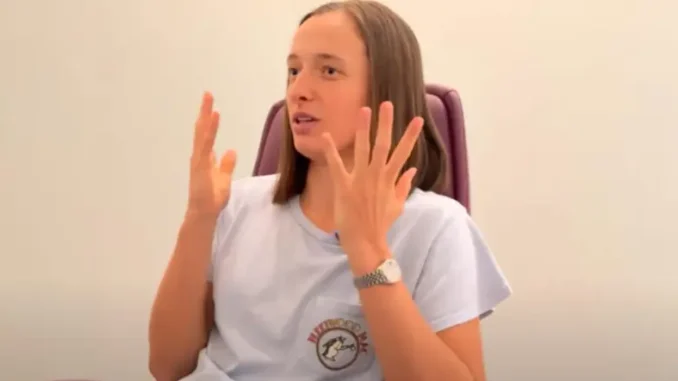
Iga Swiatek, the reigning World No. 1 in women’s tennis and a three-time Grand Slam champion, has always been celebrated for her integrity and commitment to fair play. However, the Polish star recently opened up about a challenging and emotionally draining experience involving the sport’s stringent anti-doping protocols. Swiatek shared her feelings of frustration and vulnerability after being subjected to a process that left her feeling as though her honesty and character were being unfairly questioned.
Swiatek’s revelation sheds light on the toll that the anti-doping process can take on athletes, even those with unblemished reputations. “There are moments when you feel like you’re being treated like a liar,” Swiatek candidly admitted. The statement highlights the delicate balance that exists between upholding the integrity of the sport and maintaining respect and dignity for its players. For Swiatek, the experience was a stark reminder of the pressures and challenges that come with being at the top of her game.
The tennis star explained that her frustration did not stem from the testing itself but from the invasive and often dehumanizing nature of the procedures. Like all professional athletes, Swiatek understands the necessity of anti-doping measures to ensure a level playing field. However, the rigid protocols and the presumption of guilt inherent in the process can leave athletes feeling unfairly scrutinized. “I respect the need for anti-doping rules,” she said, “but the way they’re implemented can sometimes make you feel stripped of your humanity.”
Swiatek’s honesty about her experience offers a rare glimpse into the less glamorous side of professional tennis. Behind the trophies, endorsements, and adoring fans lies a world of relentless scrutiny, where even the smallest misstep can lead to public scandal. For Swiatek, who has built her career on transparency and sportsmanship, the insinuation of dishonesty was particularly painful. “I’ve always prided myself on doing things the right way,” she explained. “To have that questioned, even for a moment, was incredibly hard.”
The emotional toll of the anti-doping process is not limited to the testing itself. Swiatek described the anxiety that comes with the uncertainty of the procedures. Athletes are often required to provide samples at inconvenient times, sometimes in the middle of training or even during rest periods. The lack of flexibility and the invasive nature of the tests can leave players feeling disrespected and undervalued. “You’re expected to be available at all times, no matter what’s happening in your life,” Swiatek noted. “It can feel like your privacy and well-being don’t matter.”
Swiatek’s comments have sparked a broader conversation about the need for reform in the anti-doping system. While the importance of rigorous testing cannot be overstated, many believe that the current approach lacks the empathy and understanding required to support athletes. Critics argue that the system should be designed not only to catch cheaters but also to protect the rights and dignity of honest competitors. Swiatek’s story serves as a powerful reminder that even the most well-intentioned policies can have unintended consequences.
Despite the challenges she has faced, Swiatek remains committed to advocating for clean sport. She acknowledges that anti-doping measures are essential for maintaining the integrity of tennis and ensuring a fair competition for all players. However, she hopes that her experience will inspire changes to the system, making it more humane and less burdensome for athletes. “I believe in the importance of fair play,” she said. “But I also believe we can find a better way to uphold those values without making players feel like criminals.”
The tennis community has largely rallied behind Swiatek, praising her for speaking out about an issue that many athletes are hesitant to address. Fellow players and fans alike have expressed their support, with some sharing their own stories of frustration and indignity during the anti-doping process. Swiatek’s willingness to open up about her experience has resonated deeply, shining a spotlight on an aspect of professional sports that is often overlooked.
For Swiatek, the experience has been a learning opportunity as well as a source of personal growth. She emphasized the importance of resilience and self-advocacy in overcoming challenges both on and off the court. “This experience has taught me to stand up for myself and for what I believe in,” she said. “It’s not easy, but it’s necessary if we want to create a better system for everyone.”
As Swiatek continues to dominate on the court, her candidness off the court has further solidified her status as a role model in the world of tennis. Her ability to balance vulnerability with strength is a testament to her character and her dedication to the sport. By sharing her story, she has not only raised awareness about the flaws in the anti-doping system but also inspired others to advocate for fairness and respect in all aspects of their lives.
Looking ahead, Swiatek remains focused on her goals, both as a player and as an advocate for change. She hopes that her experience will serve as a catalyst for meaningful dialogue and reform within the sports world. “I want to see a system that works for everyone,” she said. “One that protects the integrity of the game while also respecting the people who play it.”
In the meantime, Swiatek’s resolve and determination remain unshaken. As she prepares for the challenges of the upcoming season, she does so with the knowledge that her voice has the power to make a difference. For Iga Swiatek, being a champion is about more than just winning titles—it’s about standing up for what is right and paving the way for a brighter future in the sport she loves.
Leave a Reply